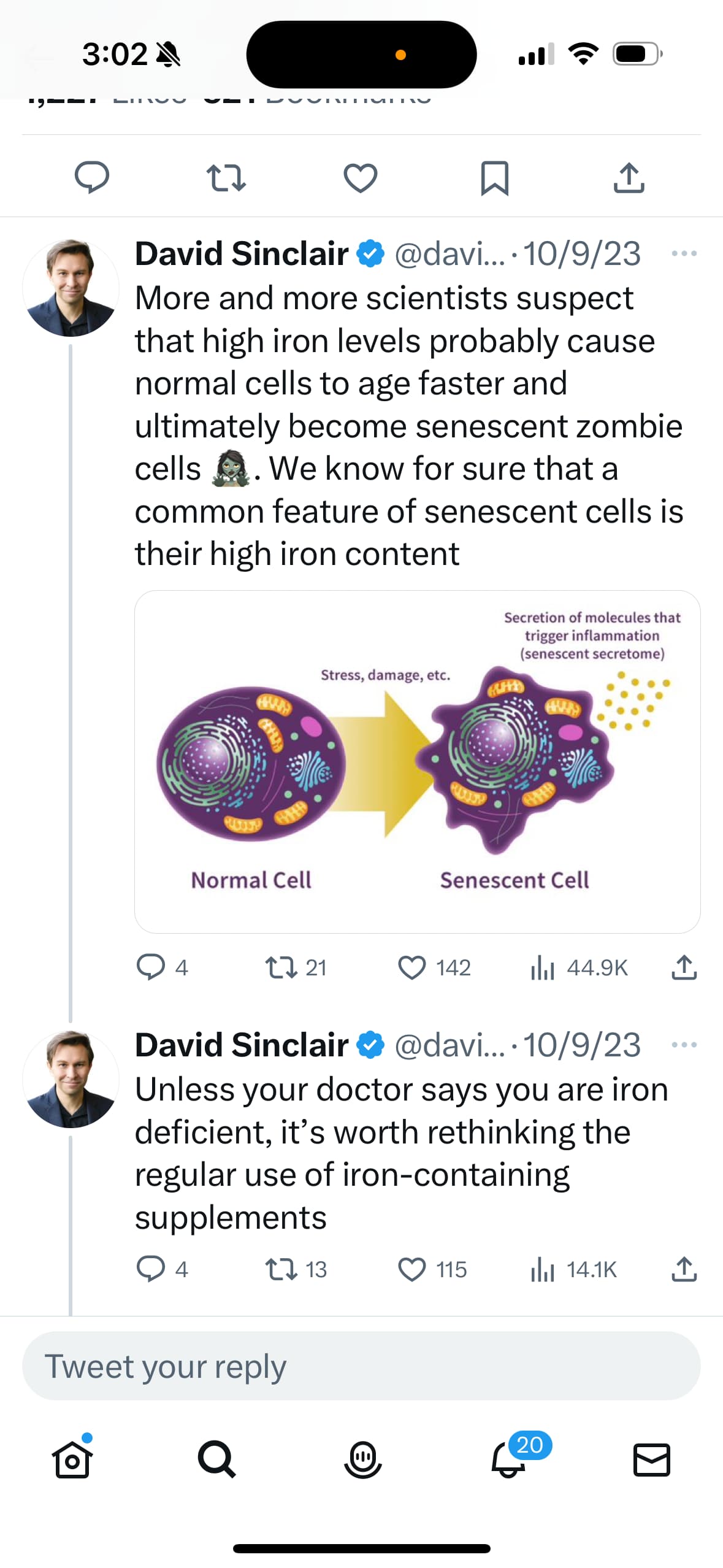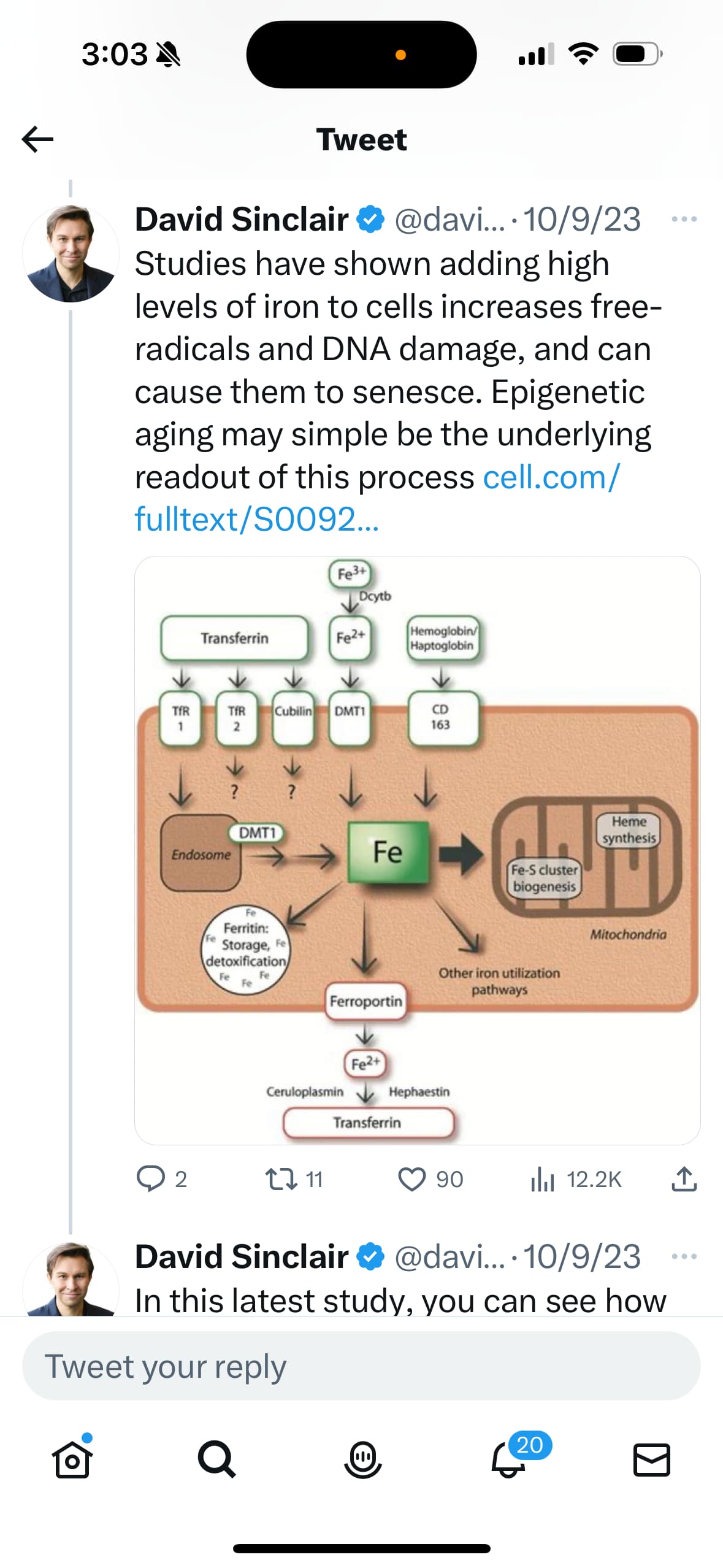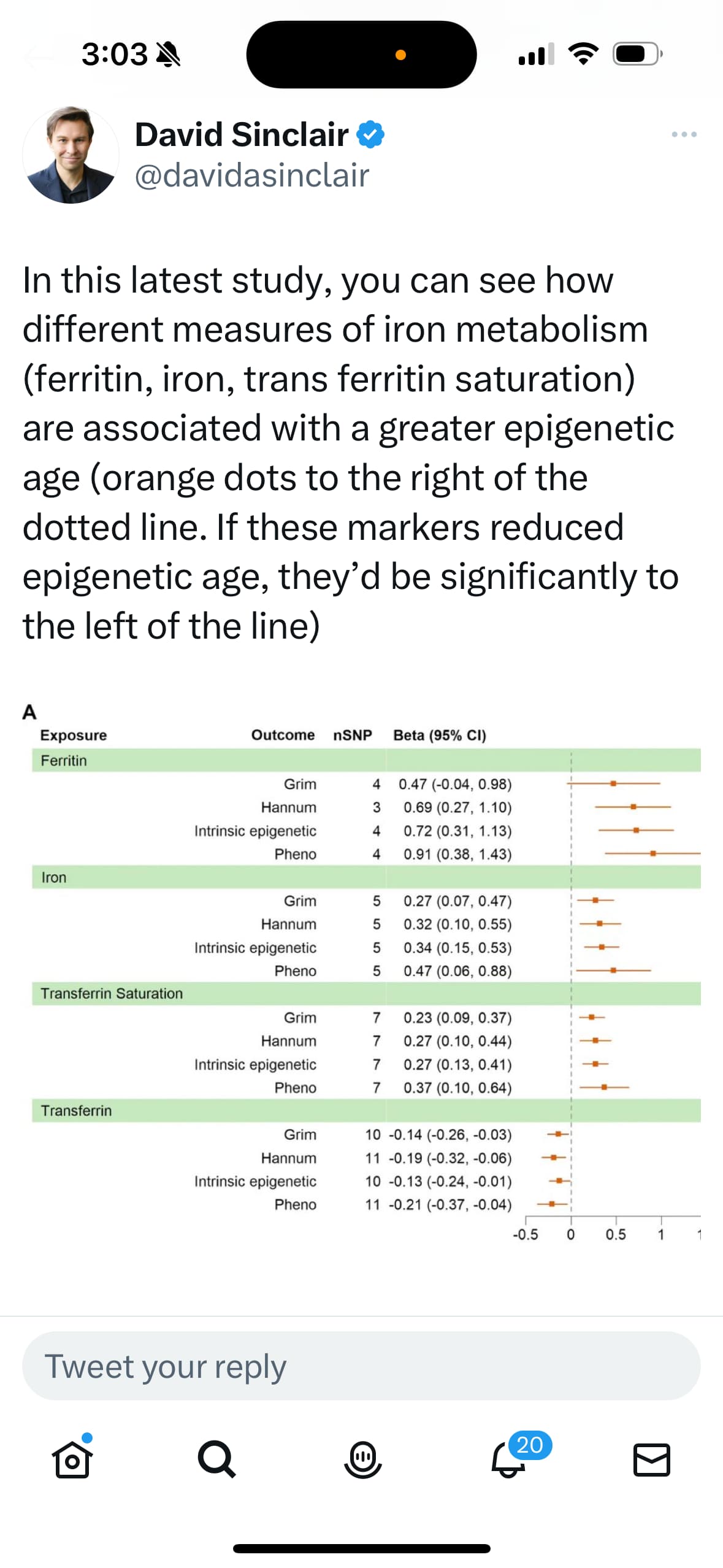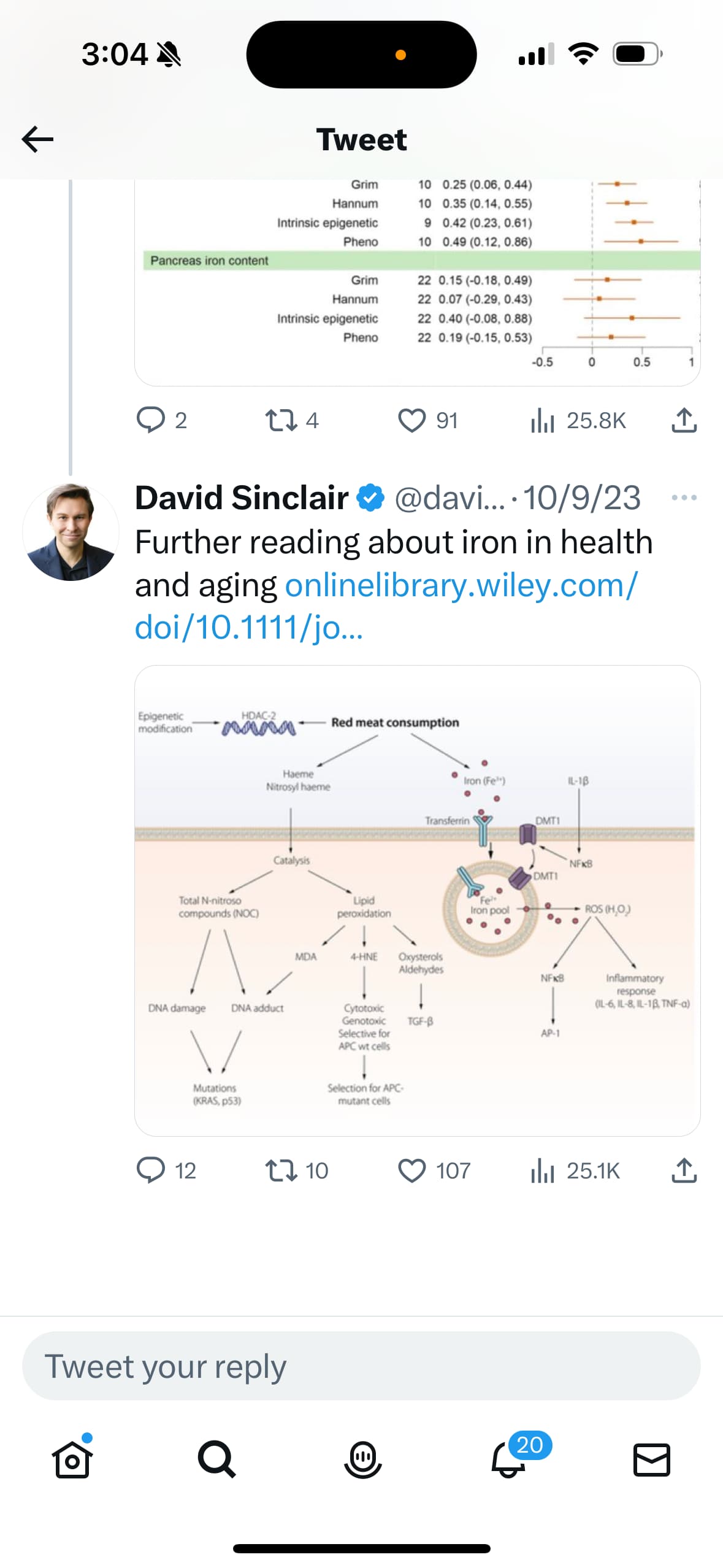A friend of mine, the late Bill Sardi wrote a book, The Iron Time Bomb. Bill used IP6 to chelate iron. IP6 is effective, readily available and inexpensive.
Could there be a connection between elevated iron and cancer?
Bill Sardi believed that the iron chelator, IP6 could be considered a life extension substance. Certainly excess iron levels are linked to heart disease. Google says high iron is linked to liver cancer.
Would be interesting to know the sweet spot here.
Iron deficiency < sweet spot < iron overload
- Iron and Your Heart: The Newly Discovered Health Risks of Excess Iron-And How You Can Beat Them
This book is where I first learned about the risk of excess iron. I read it when the book was released in 1993. Obviously it’s out of print but I see used copies online.
Yeah, well, here’s the thing: If you are on rapamycin your iron levels should be lower. Mine certainly are.
"In turn, mTOR also exerts control over iron metabolism, and the inhibition of mTOR activity by rapamycin leads to inhibition of iron accumulation via the iron-regulating hormone hepcidin [10]. Transplant patients taking sirolimus (rapamycin) often develop a microcytic anemia, which has been linked to sirolimus-induced iron deficiency
“Dumping Iron” by PD Mangan is a good read, I gave blood every 2 months until my serum ferritin levels were acceptable, now I only give blood yearly to maintain:
See Mindspan Diet, by Preston Estep. Digs into the dangers of iron in great (and clear) detail.
Do we have a consensus on ‘optimal’ ferritin levels? Or even just some guidance ranges based on the culmination of literature presented in this thread?
It’s always nice to translate theory into protocol ![]()
There is this 2017 study: The association of ferritin with cardiovascular and all-cause mortality in community-dwellers: The English longitudinal study of ageing - PMC
I’ll try to summarize it the best I can. If I missed anything important or have provided false information. Please correct me, I’m here to learn.
~5.300 men and women aged 50 years and older were participating.
Researchers made these quartiles:
The ranges that are in italics are the ranges that showed the lowest relative all cause and cardiovascular mortality (reference).
Male
Lowest ferritin (2-69 ng/ml)
2nd lowest (70-118 ng/ml)
Medium (119-193 ng/ml)
High (194-598 ng/ml)
Female
Lowest ferritin (2-44 ng/ml)
2nd lowest (45-73 ng/ml)
Medium (74-115 ng/ml)
High (116-341 ng/ml)
The covariates
“Age, marital status (married versus not), major self-reported doctor diagnosed diseases i.e. heart disease, stroke, cancer, chronic lung disease, and diabetes mellitus, educational attainment (measured using three levels ranging from no qualifications to A-levels or higher), and total net household wealth (divided into tertiles) were considered as potential confounders.”
First of all, there was no association with ferritin levels and all-cause mortality, in ALL men.
BUT!
For the subgroup of males that had no baseline chronic disease, the high range was associated with an increased risk of mortality independent of all covariates.
In men, there was a positive association between highest ferritin quartiles and the risk of cardiovascular mortality after adjustment for age, chronic diseases and anemia.
Adjustment for additional covariates (lifestyle, inflammation) attenuated this association and in this case men with ferritin levels belonging to the second lowest quartile showed significantly increased cardiovascular mortality than those in the reference category (i.e. ferritin quartile: 119-193ng/ml)
In women, those with low ferritin levels were at increased risk of all-cause mortality compared to women in the reference category irrespective of adjustment for covariates. This association persisted even after excluding major baseline chronic disease.
Quick recap, what do we know thus far?
Healthy males w/ high ferritin = increased risk of mortality. (Why not all males? Read discussion)
Males that have anemia, chronic disease and are old w/ ferritin in two highest quartiles = positive association with cardiovascular mortality.
Males that have anemia, chronic disease, are old, high hsCrp and bad lifestyle habits w/ 2nd lowest ferritin = increased risk of cardiovascular mortality compared to males in the reference range with the same covariates.
All Females w/ low ferritin = associated with increased risk of all-cause mortality.
Discussion
“Regarding all-cause mortality in men, we found a positive association with high ferritin quartiles, but only in the subgroup without any baseline major chronic disease. Because of this variation by chronic disease status, we hypothesized that the association between high ferritin levels and all-cause mortality in the general male population may be obscured by comorbidities.”
Is iron status captured in the Levine or Aging.ai calculators somehow? I’ve heard copper deficiency is also a common problem (for regulating iron) impacting longevity.
I don’t claim to know a lot about ferritin, but I do have my values from blood tests since early 2022.
420 337 358 329 332 404 371 412 325 204.6 364 202 337 176.2 176.2 319 172.9 205 253 205 145 175 157.9 165.7 171.4 190.9 180.4 173.4 222 176.7 ng/ml 298 291 mgc/L 202.5 187.8 174.9 140.4 155.4 170.5 123.2 150 152.6 147.6 168.7 177 201 165 203 168 165 164 154 142 ng/ml 164.16 129 126 134.42 118 116.07 115 120.45 96 going down? 102.5 93 79.02 95 122.54 166 109 95 115.63 161 112 105 97 110
The first was in 2021 and then 337 onwards was in 2022. It bounces around a bit whether that is a testing error or simply normal metabolic variation I dont’t know, but it has generally trended down.
Effects of iron homeostasis on epigenetic age acceleration: a two-sample Mendelian randomization study
Conclusions
The results of present investigation unveiled the causality of iron overload on acceleration of epigenetic clocks.
Thread by David Sinclair:
https://twitter.com/davidasinclair/status/1711361740686885039?s=51&t=zJMJ1xVdRJYEDYz-DHipTw
And the paper he points to at the end (I have not yet read myself)
Do we have mice lifespan data by iron levels? If iron has a significant impact on lifespan, we’d hopefully see at least a trend.
Perhaps not before 2021 as then this review/perspective paper should have included it
It does refer to effects in other organisms. For mice it discussed it this way:
EGCG extends the lifespan and healthspan of mice, attenuating markers of DNA damage and senescence-associated secretory profile, and increasing activation of autophagy [23]. EGCG also extends the lifespan of rats by reducing liver and kidney damage and inhibiting inflammation and oxidative stress [24].
EGCG is a strong chelator of iron [25]. EGCG protects against alcoholic liver disease in mice through decreasing the level of liver iron [26].
Didn’t spend long on this search, so you may find more if you look.
High iron is connected to low T



